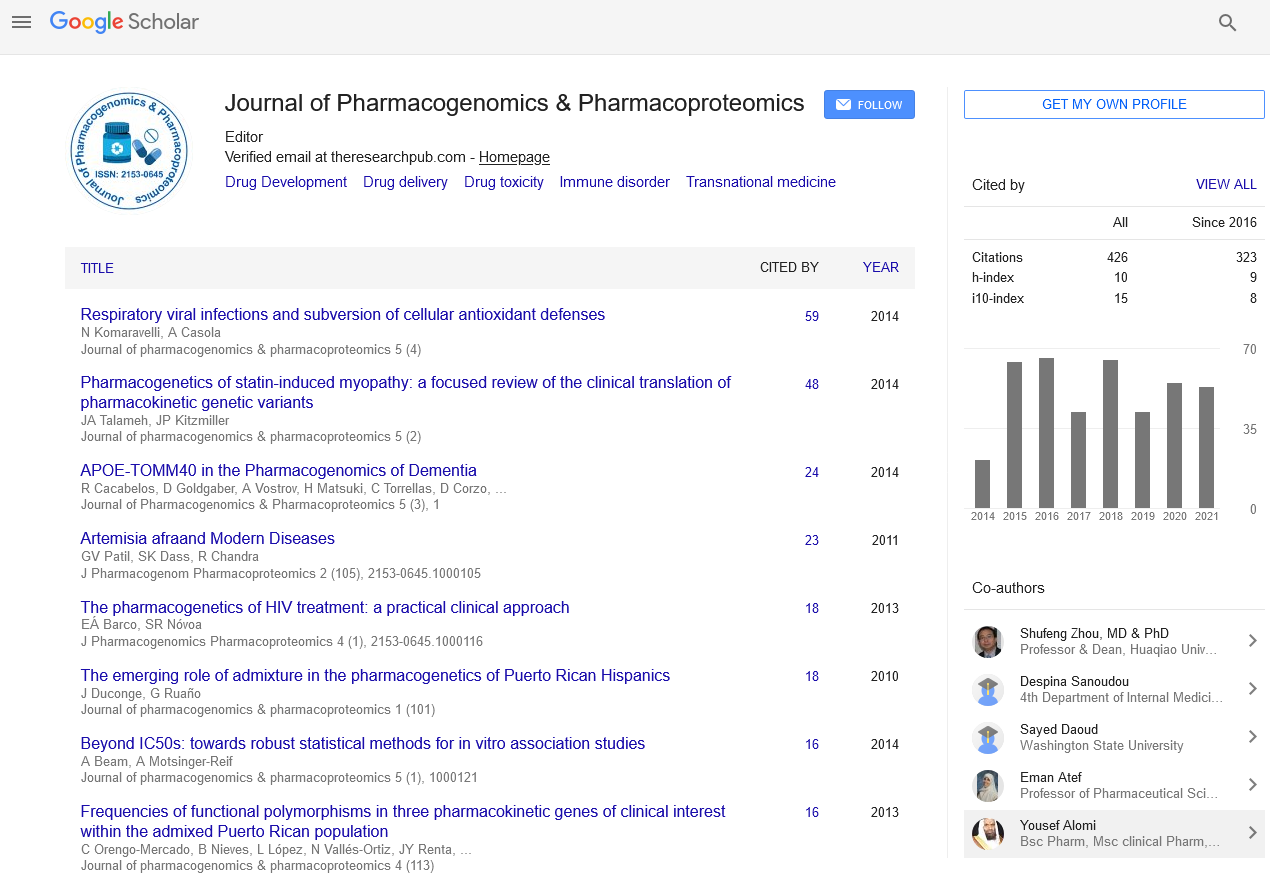Indexed In
- Open J Gate
- Genamics JournalSeek
- Academic Keys
- JournalTOCs
- ResearchBible
- Electronic Journals Library
- RefSeek
- Hamdard University
- EBSCO A-Z
- OCLC- WorldCat
- Proquest Summons
- SWB online catalog
- Virtual Library of Biology (vifabio)
- Publons
- MIAR
- Euro Pub
- Google Scholar
Useful Links
Share This Page
Journal Flyer

Open Access Journals
- Agri and Aquaculture
- Biochemistry
- Bioinformatics & Systems Biology
- Business & Management
- Chemistry
- Clinical Sciences
- Engineering
- Food & Nutrition
- General Science
- Genetics & Molecular Biology
- Immunology & Microbiology
- Medical Sciences
- Neuroscience & Psychology
- Nursing & Health Care
- Pharmaceutical Sciences
Nutrigenomic card: The nutrigenetic risk test
5th International Conference on Predictive, Preventive and Personalized Medicine & Molecular Diagnostics
December 01-02, 2016 Valencia, Spain
Juan C Carril and Ramon Cacabelos
EuroEspes Biomedical Research Center, Institute of Medical Science and Genomic Medicine, Spain
Posters & Accepted Abstracts: J Pharmacogenomics Pharmacoproteomics
Abstract:
Obesity is a complex disease in which hereditary predisposition, alimentary imbalance, metabolism and the lack of physical exercise are potentially involved. Obesity represents a risk factor for a number of prevalent diseases associated with the metabolic effects of excess of adipose tissue, including coronary heart disease, hypertension, type 2 diabetes mellitus and certain types of cancer. In the analyses carried out for the World Health Report 2002, approximately 58% of diabetes and 21% of ischemic heart disease globally were attributable to a BMI above 21 kg/m2. The health consequences range from increased risk of premature death, to serious chronic conditions that reduce the overall quality of life. This genetic test evaluates the effects of individual genetic variations in response to diet, exercise and lifestyle, all of which can cause the genes to be �??expressed�?� in a positive or negative way. Nutrigenetic testing helps to identify inherited obesity risk (ADRB2, ADRB3, ANKK1, CLOCK, FTO, LEP, LEPR, MC4R, NPY, PLIN, TAS1R2, TNF, UCP2), carbohydrate sensitivity (ADRB2, KCNJ11, SLC2A2, SLC30A8, TCFL2), saturated fat sensitivity (ADRB2, APOA2, APOA5, APOC3, FABP2, FTO, LPL, PPARG, TNF), diabetes risk (ADRB2, APOC3, FABP2, FTO, KCNJ11, SLC2A2, SLC30A8, TCFL2) and exercise response (ADRB2, APOC3, LIPC, TCFL2). The nutrigenomic card provides genetic results and additional information that the patient needs to know in order to make informed modifications to their diet and lifestyle to improve their health and wellbeing. This study present allelic and genotyping frequency of 26 SNPs analyzed in the Spanish population to determine their relevance as informative nutrigenomic biomarkers.
Biography :
Juan C Carril is the Director of the Genomics and Pharmacogenomics Department at EuroEspes Biomedical Research Center, Institute of Medical Science and Genomic Medicine, Corunna, Spain. He has received his PhD from Santiago de Compostela University in 2000 with the thesis entitled Genetic structure and profile of the populations of the Iberian Peninsula by means of markers (STRs and SNPs) of the human Y-chromosome. He has published more than 40 scientific publications in the fields of population genetics, forensic genetics, genetic epidemiology and pharmacogenetics and over 40 papers at national and international conferences.
Email: genomica@euroespes.com


